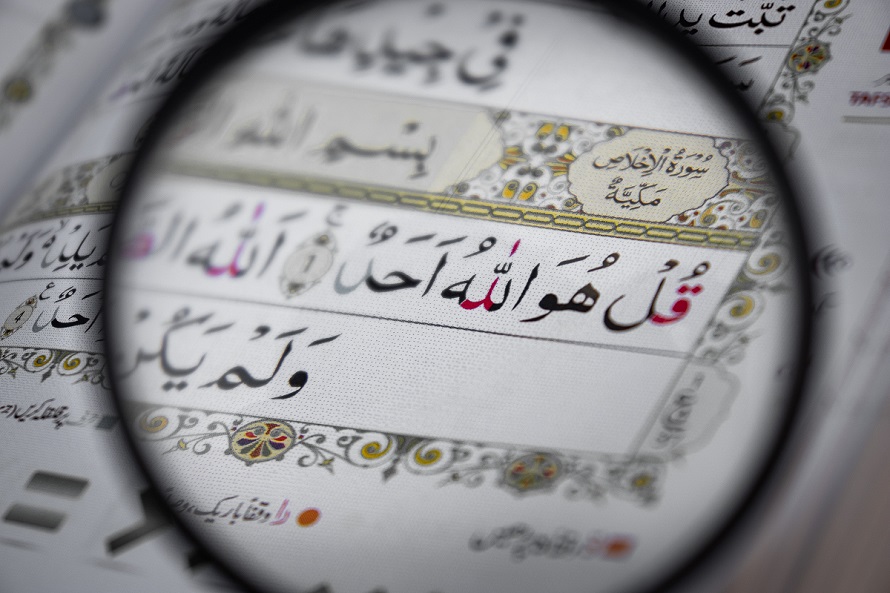The Holy Quran (اَلْقُرْآنُ) is the ultimate source of guidance and wisdom for Muslims all over the world. It is the literal word of Allah, revealed to Prophet Muhammad (PBUH) over a period of 23 years. The Quran contains 114 chapters, each addressing various aspects of human life and providing guidance on how to lead a fulfilling and righteous life. Throughout the Quran, the word “Quran” or “Al-Quran” is mentioned numerous times, emphasizing its importance in the life of a Muslim.
The word “Quran” or “Al-Quran” is used in the holy Quran to refer to the sacred scripture of Islam that contains the teachings and guidance of Allah as revealed to the Prophet Muhammad (peace be upon him). It is a word of Arabic origin that means “recitation” or “reading”. The Quran is considered to be the literal word of God and is the primary source of Islamic beliefs and practices. It is recited daily by Muslims around the world and is revered as the ultimate authority on matters of faith, morality, and law.
Here we compile some of the references in the Quran where the word “Quran” or “Al-Quran” is used:
Table of Contents
Ramadan & Quran
“The month of Ramadan [is that] in which was revealed the Quran, a guidance for the people and clear proofs of guidance and criterion.” (Surah Al-Baqarah, 2:185)
Explanation
This ayah states that the month of Ramadan is the month in which the Quran was revealed as a guidance for mankind. This is a clear indication that Ramadan is a special and blessed month, and Muslims should take advantage of this time to connect with the Quran and seek guidance from it.
Furthermore, the ayah also reminds us that Allah is forgiving and forbearing. We should not be afraid to ask questions and seek clarification about matters that may cause us trouble. In fact, Allah encourages us to seek knowledge and provides us with the Quran as a means of gaining understanding.
Overall, this ayah highlights the significance of the month of Ramadan and the Quran as a source of guidance and clarity for mankind.
The Prohibition of Inquiring About Matters That May Cause Trouble
O you who believe! Ask not about things which, if made plain to you, may cause you trouble. But if you ask about them while the Quran is being revealed, they will be made plain to you. Allah has forgiven that, and Allah is Oft-Forgiving, Most Forbearing. (Surah Al-Maidah, 5:101)
Explanation
This verse was revealed to address a particular incident. At the time, some Companions of the Prophet Muhammad (peace be upon him) were inquiring about the meat of the animals that were slaughtered by the People of the Book (Jews and Christians) who lived in Medina. They wanted to know if it was permissible to eat such meat or not.
Allah revealed this verse to the Prophet Muhammad (peace be upon him) to instruct the Companions not to ask too many questions about such matters, because Allah had already made clear what is permissible and impermissible in the Quran. He assures them that if they do come across any unclear or confusing matters, they will be clarified by Allah Himself.
This verse teaches an important lesson about the proper attitude towards seeking knowledge. While it is important to seek knowledge and ask questions, one should avoid getting caught up in unnecessary details or becoming obsessed with gaining knowledge that may lead to confusion or distress. Instead, one should focus on the fundamental teachings of the Quran and trust that Allah will provide the guidance and clarity needed to navigate any unclear matters.
Quran is in Arabic
“And thus We have revealed to you an Arabic Quranthat you may warn the Mother of Cities [i.e. Makkah] and those around it.” (Surah Ash-Shura, 42:7)
Explanation
This verse mentions the revelation of the Quran in the Arabic language, which is understandable to the people of Makkah and its surrounding areas. The objective of this revelation was to warn the people of Makkah and its neighboring regions about the consequences of disobedience to Allah’s commands. The phrase “Umm al-Qura” (Mother of Cities) refers to Makkah, which was regarded as the center of the Arab world.
The revelation of the Quran in Arabic was significant because it was the language of the people to whom the message was primarily addressed. The language of the Quran is clear and easy to understand, making it accessible to all people, regardless of their level of education or social status.
Furthermore, the revelation of the Quran in Arabic was also significant because it demonstrated the eloquence and linguistic excellence of the Arabic language. This helped to dispel the notion held by some that the Arabs were an uncivilized people with no cultural or intellectual achievements.
Quran is from Allah
“And this Quran is not such as could ever be produced by other than Allah (Lord of the heavens and the earth), but it is a confirmation of (the revelation) which was before it [i.e. the Taurat (Torah), and the Injeel (Gospel), etc.], and a full explanation of the Book (i.e. laws and orders, etc, decreed for mankind) – wherein there is no doubt from the the Lord of the ‘Alamin (mankind, jinns, and all that exists).” (Surah Yunus, 10:37)
Explanation
This verse highlights the uniqueness and divinity of the Quran. It emphasizes that the Quran is not a human creation, but rather a revelation from Allah, the Lord of the heavens and the earth. The Quran confirms and supplements the previous divine revelations, such as the Taurat and Injeel, and serves as a complete guide for humanity.
Furthermore, the verse declares that there is no doubt in the Quran, as it is a divine revelation from the Lord of the worlds. It contains the laws and orders for mankind to follow, and is a source of guidance and enlightenment for all people.
Overall, this verse highlights the divine origin and completeness of the Quran, and emphasizes its importance as a source of guidance for humanity.
Quran is revealed gradually
“And (it is) a Quran which We have divided (into parts), in order that you might recite it to men at intervals. And We have revealed it by stages. (in 23 years).” (Surah Al-Isra, 17:106)
Explanation
This verse highlights the gradual revelation of the Quran. It was not revealed to Prophet Muhammad (peace be upon him) all at once, but rather in stages over a period of 23 years. The reason for this gradual revelation was to make it easier for the people to understand and memorize, as well as to give them time to implement its teachings in their lives.
The verse also emphasizes the importance of reciting the Quran to others, as it states that the Quran was divided into parts so that it could be recited to men at intervals. This highlights the importance of spreading the message of the Quran and sharing its teachings with others.
Additionally, the verse highlights the miraculous nature of the Quran, as it was revealed in a unique and gradual manner that was not seen with any previous scripture. This emphasizes the divine origin of the Quran and its status as a guidance for all of mankind.
Pay Attention when Quran is recited
“And when the Quran is recited, then listen to it and pay attention that you may receive mercy.” (Surah Al-A’raf, 7:204)
Explanation
In this verse, Allah Almighty commands the believers to listen attentively when the Quran is recited and to pay heed to it so that they may receive mercy from Allah. It is a reminder to us that the Quran is not just a book to be read, but it is meant to be listened to with the intention of receiving guidance and blessings. The Prophet (peace be upon him) would recite the Quran in a beautiful and melodious voice, and the companions would listen to it with rapt attention. Therefore, we must also listen to the Quran attentively and reflect on its meanings, as it is the source of guidance and mercy for us.
Moreover, this verse also emphasizes the importance of being present and attentive during the recitation of the Quran, especially in congregational prayers. It reminds us to avoid any distractions and to focus solely on listening to the Quran, so that we can benefit from its guidance and blessings.
Overall, this verse highlights the significance of actively listening to the Quran with the intention of receiving guidance and mercy from Allah, and being attentive and focused during its recitation.
Reason why Quran was not revealed at once
“And those who disbelieve say: “Why is not the Quran revealed to him all at once?” Thus (it is sent down in parts), that We may strengthen your heart thereby. And We have revealed it to you gradually, in stages. ” (Surah Al-Furqan, 25:32)
Explanation
This verse explains the gradual revelation of the Quran, which was revealed in parts over a period of 23 years. The disbelievers of Makkah demanded that the entire Quran be revealed at once, but Allah responded by saying that it was revealed gradually in order to strengthen the heart of the Prophet Muhammad (peace be upon him) and to make it easier for him to remember.
The revelation of the Quran in stages allowed for the Prophet (peace be upon him) to teach and explain the Quranic teachings to his followers gradually, so they could better understand and implement the teachings in their lives. It also allowed for the Quran to address the concerns and challenges of the Muslim community as they arose.
This verse also emphasizes the importance of patience and trust in Allah’s divine plan. The gradual revelation of the Quran served a greater purpose and was a testament to the wisdom and foresight of Allah.
Quran is easy to remember
“And We have certainly made the Quraneasy for remembrance, so is there any who will remember?” (Surah Al-Qamar, 54:17)
Explanation
In this verse, Allah Almighty emphasizes the ease with which the Quran can be memorized and learned. The Quran is a book that was sent to guide humanity, and it contains the perfect and complete guidance for all aspects of life. It is essential for every Muslim to not only recite the Quran but also memorize and understand it.
Allah has made it easy to memorize and recite the Quran, so it is the responsibility of every Muslim to take advantage of this opportunity. Memorizing the Quran is a virtuous act that brings great rewards, and it is a means of getting closer to Allah and gaining His blessings.
Furthermore, this verse challenges the believers to take advantage of this ease and make an effort to memorize the Quran. It is a call to action for every Muslim to strive to learn the Quran and apply its teachings in their daily lives.
Overall, this verse emphasizes the importance of the Quran in the life of a Muslim and encourages them to make an effort to memorize and understand its teachings.
Quran provides clear guidance with no ambiguity
“And those who disbelieve say: “Why is not the Quran revealed to him all at once?” Thus (it is sent down in parts), that We may strengthen your heart thereby. And We have revealed it to you gradually, in stages. ” (Surah Al-Furqan, 25:32)
Explanation
This verse addresses the disbelievers who objected to the gradual revelation of the Quran to Prophet Muhammad (peace be upon him) over a period of 23 years. They questioned why the Quran was not revealed all at once instead of in fragments, as this would have made it easier to comprehend.
The verse provides a response to this objection by explaining that the gradual revelation of the Quran served to strengthen the heart of the Prophet (peace be upon him) and the believers. Had the entire Quran been revealed at once, it would have been overwhelming and difficult to fully comprehend and implement. The gradual revelation allowed for the verses to be understood, absorbed, and acted upon in a manner that was manageable and feasible.
Furthermore, the spacing out of the revelation helped with memorization and ensured that the message was preserved accurately. The Quran was not revealed haphazardly, but rather with precision and purpose.
Overall, this verse highlights the wisdom behind the gradual and spaced-out revelation of the Quran and addresses the objections raised by the disbelievers.
Jinn listening to the Quran and returning as warners
“And when We directed to you a few of the jinn, listening to the Quran. And when they attended it, they said, ‘Listen quietly.’ And when it was concluded, they went back to their people as warners.” (Surah Al-Ahqaf, 46:29)
Explanation
This verse mentions a unique incident where some jinn had come to listen to the recitation of the Qur’an. The jinn are a creation of Allah that are made from smokeless flame and have free will like humans. They can be either believers or disbelievers and are mentioned throughout the Qur’an as being accountable for their actions.
The context of this verse is that the Quraysh, the disbelieving tribe in Mecca, had accused the Prophet Muhammad (peace be upon him) of being possessed by jinn. Allah responds to this accusation by mentioning that the jinn themselves had come to listen to the Qur’an and were affected by its message.
The verse highlights the power of the Qur’an to move even those who are not human. The jinn who listened to the Qur’an were so affected that they went back to their people as warners, indicating that they had accepted the truth of Islam and were spreading the message to other jinn. This incident also serves as evidence of the truthfulness of the Prophet Muhammad (peace be upon him) and the message he brought, as even the jinn testified to the power and truth of the Qur’an.
The Manner of Reciting Quran in a Beautiful Tone
“Or a little more; and recite the Quran (aloud) in a slow, (pleasant tone and) style.” (Surah Al-Muzzammil, 73:4)
Explanation
This verse is part of the instructions given to the Prophet Muhammad (peace be upon him) on how to recite the Quran. It highlights the importance of reciting the Quran with a measured and rhythmic tone, rather than just reading it without any attention to the way it is recited. The Arabic word used in this verse for “measured recitation” is “tarteel,” which refers to a slow and deliberate way of reciting the Quran, with each word pronounced clearly and distinctly.
According to Islamic scholars, this verse emphasizes the importance of both the content and the delivery of the Quran. It teaches that the Quran should not only be recited correctly in terms of its words and meanings, but also with the proper tone, rhythm, and emphasis. This is because the Quran is not just a book of words, but a divine revelation meant to be recited and heard in a way that moves and inspires the listener.
Furthermore, the verse also suggests that one should not rush through the recitation of the Quran, but rather take the time to recite it with care and attention. This is important because the Quran contains the guidance and teachings of Allah, and reciting it with a sincere heart and a measured tone can help to deepen one’s understanding of its message and foster a stronger connection with Allah.
Argument of Kuffar on Quran revealing
And they say: “Why is not this Quran sent down to some great man of the two towns (Surah Az-Zukhruf, 43:31)
Explanation
In this verse, the disbelievers are questioning the authenticity of the Quran and the wisdom of Allah (SWT) in choosing the Prophet Muhammad (SAW) to be the recipient of this divine revelation. They are asking why Allah (SWT) did not choose a “great man” from one of the two major cities of the time, Mecca or Ta’if, instead of choosing Muhammad (SAW), who was from a smaller and less influential tribe in the area.
The verse is a response to the disbelievers’ objections and doubts regarding the authenticity and credibility of the Quran. It reinforces the fact that Allah (SWT) is the ultimate authority and has the power to choose whomever He wills as His messenger. It also highlights the importance of humility and submission to Allah’s will, regardless of one’s social status or position in society.
In summary, this verse teaches us that the Quran is the word of Allah (SWT) and is not bound by any human standards or limitations. Its authenticity and credibility are not dependent on the social status or position of the person chosen to receive it. Instead, it is a divine revelation sent down to guide all of humanity towards the path of righteousness and to help them attain success in this life and the hereafter.
Refusal to Prostrate Upon Hearing the Quran
And when the Quranis recited to them, they fall not prostrate (Surah Al-Inshiqaaq, 84:21)
Explanation
This verse mentions a group of people who refuse to prostrate themselves in worship when the Quran is recited to them. Prostration, or sujood, is a form of worship that involves placing one’s forehead on the ground as a sign of humility and submission to Allah.
In this verse, Allah is emphasizing the importance of prostration as an act of worship. By refusing to prostrate when the Quran is recited, these people are showing their disobedience and lack of submission to Allah’s commands.
This can also be seen as a reflection of their arrogance and pride, as they refuse to humble themselves before their Creator. The Quran teaches that humility is an essential quality for believers, and that those who refuse to humble themselves before Allah will ultimately be humbled on the Day of Judgment.
Therefore, this verse serves as a reminder of the importance of prostration as an act of worship and the significance of humility in the eyes of Allah.
Conclusion
In conclusion, the Quran is a timeless guide that provides Muslims with guidance on how to lead a fulfilling and righteous life. The frequent mention of the word “Quran” or “Al-Quran” throughout the Quran emphasizes its significance and importance. It is a source of guidance, wisdom, and inspiration, and Muslims all over the world strive to understand its teachings and implement them in their daily lives. May Allah guide us all on the straight path and help us to fully comprehend and implement the teachings of the Quran.
FAQ
In Arabic, “Al-Quran” translates to “the recitation” or “the reading.” This term emphasizes the Quran’s nature as a book meant to be recited aloud and internalized. It underscores the oral tradition of Quranic recitation in Islamic practice, where the beauty of its verses is often appreciated through melodious recitation.
This language choice was significant because it was the native tongue of the Arabian people to whom the message was initially addressed. Arabic was a rich and expressive language, well-suited for conveying the depth and complexity of divine guidance. Additionally, the Quran’s linguistic excellence served as a challenge to the Arabs, who prided themselves on their mastery of language, affirming the Quran’s divine origin.
The Quran was revealed gradually over 23 years, addressing various socio-political contexts and evolving needs of the Muslim community. This gradual revelation allowed for a flexible and adaptive approach to guidance, addressing specific challenges and providing timeless principles. It also facilitated a deeper engagement with its teachings, allowing believers to reflect, internalize, and implement its guidance progressively. This approach ensures the Quran’s relevance across different times and cultures while maintaining its core message intact.
You can find this and more in our blog: Benefits of Learning Holy Quran.
Join Learn Quran Kids
Book 3 days Free Trial Class!
Get 20% Ramadan Discount




